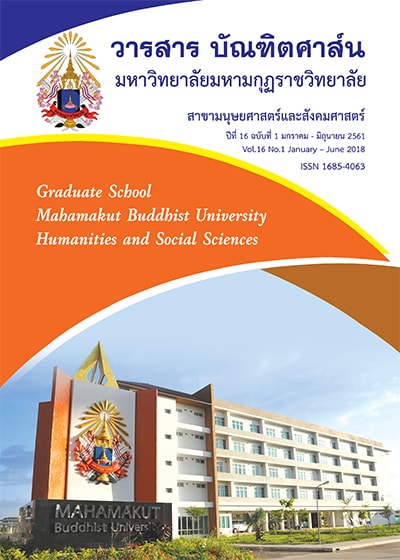การวิเคราะห์องค์ประกอบเชิงยืนยันของตัวแบบในการจัดการวิสาหกิจชุมชนไทย
คำสำคัญ:
การวิเคราะห์องค์ประกอบเชิงยืนยัน, ตัวแบบ การจัดการวิสาหกิจชุมชน, วิสาหกิจชุมชนไทยบทคัดย่อ
การวิจัยนี้มีวัตถุประสงค์เพื่อวิเคราะห์องค์ประกอบเชิงยืนยันของตัวแบบในการจัดการวิสาหกิจชุมชนไทย ใช้ระเบียบวิธีวิจัยเชิงปริมาณ เก็บรวบรวมข้อมูลด้วยการส่งแบบสอบถามไปยังประธานกลุ่มวิสาหกิจชุมชนดีเด่นของประเทศไทย อันดับที่ 1 ประจำปี พ.ศ. 2555-2558 กับกลุ่มตัวอย่างจำนวน 169 แห่ง ที่กำหนดโดยใช้ตารางของ Krejcie และ Morgan ค่าความเชื่อมั่นระดับ 0.05 วิเคราะห์ข้อมูลด้วยการวิเคราะห์องค์ประกอบ (Factor Analysis) ผลการวิจัยพบว่า โดยองค์ประกอบที่ 1 มีตัวแปรทั้งหมด 9 ตัว ประกอบด้วย กิจกรรมหลัก ช่องทางการจำหน่ายสินค้า การเสนอคุณค่า การสร้างความสัมพันธ์กับลูกค้า การจัดการเกี่ยวกับทรัพยากรหลัก พันธมิตรหลัก การจัดการโครงสร้างต้นทุน กลุ่มลูกค้า และ กระแสรายได้ มีค่าน้ำหนักองค์ประกอบเท่ากับ .827,.810,.801,.797,.758,.758,.740.737,.700 ตามลำดับ องค์ประกอบที่ 2 มีตัวแปรทั้งหมด 6 ตัว ประกอบด้วย การใช้ความรู้ การกระจายความรู้ การกำหนดความต้องของความรู้ในการจัดการวิสาหกิจชุมชน การตรวจสอบและติดตามความรู้ การสร้างและจัดหาความรู้ และ การจัดเก็บความรู้ มีค่าน้ำหนักองค์ประกอบเท่ากับ .894,.885,.881,.862,.827,.743 ตามลำดับ องค์ประกอบที่ 3 มีตัวแปรทั้งหมด 7 ตัว ประกอบด้วย ภาพลักษณ์ตราสินค้า ภาวะผู้นำ กลยุทธ์การจัดการความรู้ คน(ประธานกลุ่มวิสาหกิจชุมชน, คณะกรรมการวิสาหกิจชุมชนและสมาชิก) เทคโนโลยีสารสนเทศและการสื่อสาร ความรู้หรือภูมิปัญญา และวัฒนธรรมองค์กร/ชุมชน มีค่าน้ำหนักองค์ประกอบเท่ากับ .846,.842,.835,.826,.782,.767,.748 ตามลำดับ ซึ่งผลการวิจัยนี้สามารถนำไปใช้ในการวิเคราะห์ชุดความรู้ และพัฒนาโครงสร้างความรู้เชิงแนวคิดเกี่ยวกับการจัดการวิสาหกิจชุมชนต่อไป
เอกสารอ้างอิง
ธานินทร์ ศิลป์จารุ. (2551). การวิจัยและการวิเคราะห์ข้อมูลทางสถิติด้วย SPSS. กรุงเทพฯ: วีอินเตอร์พรินท์.
ธงชัย พาบุ. (2552). การจัดการความรู้ธุรกิจสุดยอดหนึ่งตำบลหนึ่งผลิตภัณฑ์. วิทยานิพนธ์ปรัชญาดุษฎีบัณฑิตสาขาวิชาสารสนเทศศึกษา บัณฑิตวิทยาลัย, มหาวิทยาลัยขอนแก่น.
บุญชม ศรีสะอาด. (2553). การวิจัยเบื้องต้น. กรุงเทพฯ: สุวีริยาสาส์น.
ภัทรธิรา ผลงาม. (2545). รายงานการวิจัยเรื่องการพัฒนาธุรกิจชุมชนแบบมีส่วนร่วม : การผลิตไวน์ข้าวเหนียว (ดำ).เลย: สถาบันราชภัฎเลย.
เมธา สุธีรโรจน์. (2547). ผลการวิจัยเรื่องปัจจัยที่มีผลต่อความสำเร็จของธุรกิจชุมชนในภาคตะวันออกเฉียงเหนือ. ว. วิจัยและฝึกอบรม สถาบันเทคโนโลยีราชมงคล วิทยาเขตภาคตะวันออกเฉียงเหนือ, 2(1), 2-15.
รัชกฤช คล่องพยาบาล. (2553). คู่มือการเขียนแผนธุรกิจ: ธุรกิจการผลิต. (พิมพ์ครั้งที่ 2). กรุงเทพฯ: สำนักงานส่งเสริมวิสาหกิจขนาดกลางและขนาดย่อม.
สำนักงานเกษตรจังหวัดอุดรธานี. (2561). พระราชบัญญัติส่งเสริมวิสาหกิจชุมชน พ.ศ. 2548. ค้นเมื่อ 2 มกราคม 2561, จาก http://www.udonthani.doae.go.th/
สำนักงานเลขานุการคณะกรรมการส่งเสริมวิสาหกิจชุมชน. (2556). วิสาหกิจชุมชนดีเด่นปี 2555-2558. กรุงเทพฯ: โรงพิมพ์ชุมนุมสหกรณ์การเกษตร.
สำราญ มีแจ้ง. (2557). สถิติขั้นสูงสำหรับการวิจัย : ทฤษฎีและปฏิบัติ. กรุงเทพฯ: โรงพิมพ์แห่งจุฬาลงกรณ์มหาวิทยาลัย.
Boonchom Srisa-ard. (2010). The basic research. Bangkok: Suveeriyasan.
Jaimanut Ploydee. (1997). Factors effecting the success and failure of community business in comparison of macro and micro levels (Kiriwong Village, Lansaka District, Nakhonsrithammarat and Kham Khuean Kaew District, Yasothon). Master thesis in Sociology, Graduate School, Chulalongkorn University.
Metha Sutheeraroj. (2004). The study of the successful factors of the community enterprise in The North East of Thailand. R. Research and Training, Technology Rajamangala Institute, the North Eastern Campus, 2(1), 2-15.
Office of the Secretary of the Board of Community Enterprise. (2013). The Excellent community enterprise from 2012 – 2015. Bangkok: The Agricultural Co-operative Federation Press.
Osterwalder, A. and Pigneur, Y. (2009). Business Model Generation: A Handbook for Visionaries, Game Changers, and Challengers. Amsterdam: The Netherlands.
Petrovic,O.,Kittl, C. and Teksten, R.D. (2001). Developing business models for eBusiness. International Conference of Electronic Commerce 2001, Vienna.
Phatthira Phon-ngam. (2002). The report of the co-operative business development study: Case study of Black sticky rice wine production. Loei: Loei Rajabhat University.
Probst, G., Raub, S. and Romhardt, K. (2000). Managing Knowledge: Building Blocks for Success. Chichester: John Wiley and Sons.
Ratchakrit Khlongpayaban. (2013). Guideline for Business Plan: Production Business. (2nd Edition). Bangkok: The Office of SMEs Promotion (OSMEP).
Samran Meechang. (2014). The Advance Statistics for Research: Theory and Practice. Chulalongkorn University Press.
Sveiby, K..E. (1997). The New Organizational Wealth: Managing and Measuring Knowledge Based Assets. San Francisco, CA: Berrett-Koehler.
Tanin Siljaru. (2008). The research and data analysis with the SPSS program. Bangkok: We-Interprint.
Thongchai Pabu. (2009). Knowledge Management for “One Tumbon One Product” community business. Ph.D. Thesis in Information Technology, Graduate School, Khon Kaen University.
Tuamsuk, K., Phabu, T, &Vongprasert, C. (2013). Knowledge management model of community business: Thai OTOP Champions. Journal of Knowledge Management 17(3): 363-378.
Turban, E. et al. (2004). Information Technology for Management: TransformingOrganizations in the Digital Economy. (4thed). New Jersey: John Wiley & Sons.
Udonthani Provincial Agricultural Extension Office. (2018). Community Enterprise Promotion Act, B.E. 2548. Accessed on 2 January 2018, Available from: http://www.udonthani.doae.go.th/
Wickramasinghe, N. and Lubitz, D.V. (2007). Knowledge-Based Enterprise: Theories and Fundamentals. Pennsylvania: Idea Group Publishing.
ดาวน์โหลด
เผยแพร่แล้ว
รูปแบบการอ้างอิง
ฉบับ
ประเภทบทความ
สัญญาอนุญาต
บทความวิชาการและบทความวิจัยในวารสารฉบับนี้ถือเป็นความรับผิดชอบของผู้เขียนเท่านั้น บทความที่ได้รับการตีพิมพ์ในวารสารบัณฑิตศาส์น ถือเป็นลิขสิทธิ์ของมหาวิทยาลัยมหามกุฏราชวิทยาลัย ตามพระราชบัญญัติลิขสิทธิ์



